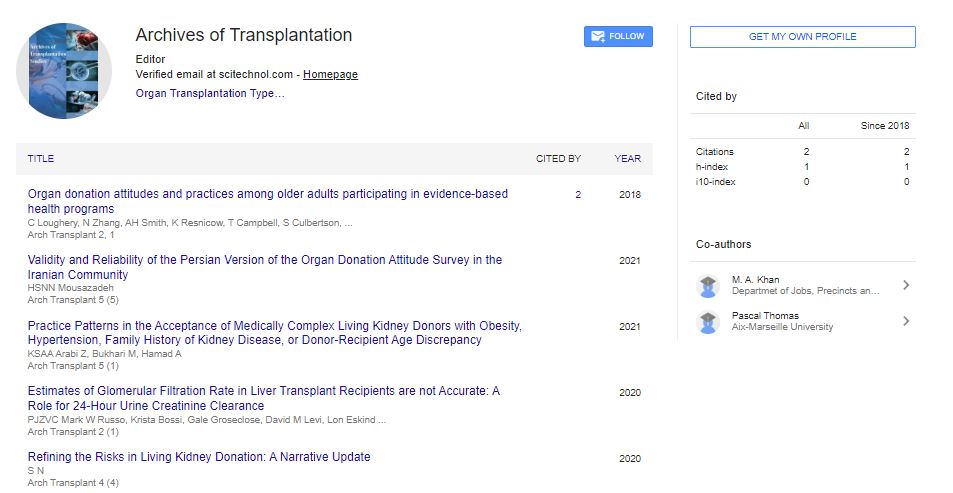Opinion Article, Arch Transplant Vol: 7 Issue: 3
Immunomodulatory Therapies for Improving Graft Survival in Heart Transplantation
Ruben Doyle*
1Department of Critical Care Medicine, University of Alberta, Edmonton, Canada
*Corresponding Author: Ruben Doyle,
Department of Critical Care Medicine,
University of Alberta, Edmonton, Canada
E-mail: doyleruben960@gmail.com
Received date: 02 September, 2023, Manuscript No. AT-23-116168;
Editor assigned date: 04 September, 2023, PreQC No AT-23-116168(PQ);
Reviewed date: 18 September, 2023, QC No AT-23-116168;
Revised date: 25 September, 2023, Manuscript No AT-23-116168(R);
Published date: 05 October, 2023, DOI: 10.4172/AT.1000150.
Citation: Doyle R (2023) Immunomodulatory Therapies for Improving Graft Survival in Heart Transplantation. Arch Transplant 7:3.
Abstract
Description
Heart transplantation remains the definitive treatment for end-stage heart failure, significantly enhancing patient outcomes. However, graft rejection and the long-term burden of immunosuppression remain major challenges. The review established strategies, including T-cell targeted therapies and stimulation blockade, and discuss emerging approaches such as Janus Kinase Inhibitors (JAK) inhibitors and gene editing. These immunomodulatory therapies hold promise for prolonging graft survival, reducing adverse effects, and improving patient quality of life.
Heart transplantation represents a life-saving intervention for individuals facing end-stage heart failure. Since its inception, this procedure has significantly improved survival rates and quality of life for recipients. Nevertheless, the immune system's natural response to a transplanted heart remains a formidable challenge, necessitating the use of immunosuppressive therapies.
In recent years, the field of heart transplantation has witnessed remarkable advancements in immunomodulatory strategies aimed at achieving a delicate balance between preventing graft rejection and minimizing the adverse effects associated with immunosuppression. The overview of the evolving landscape of immunomodulatory therapies in heart transplantation. It explores established approaches, novel agents, and the concept of personalized immunosuppression.
Immunomodulatory therapies
T-Cell targeted therapies: Anti-Thymocyte Globulin (ATG), a polyclonal antibody, targets T-cells and is used in induction therapy to prevent early graft rejection.
Alemtuzumab: This monoclonal antibody targets CD52, a cell surface antigen found on T and B cells. Alemtuzumab is employed for induction therapy and has shown promise in minimizing chronic rejection.
Belatacept: Belatacept inhibits the costimulation of T-cells by binding to CD80 and CD86 on antigen-presenting cells. It provides an alternative to calcineurin inhibitors, potentially reducing nephrotoxicity a nd hypertension.
Sirolimus and Everolimus: These Mammalian Target of Rapamycin (mTOR) inhibitors possess immunosuppressive properties and are being investigated for their role in preventing chronic graft rejection.
Janus Kinase (JAK) inhibitors: JAK inhibitors, such as tofacitinib, offer a novel approach to modulating the immune response post-transplantation.
Gene editing and tolerance induction: Emerging techniques in gene editing, such as CRISPR-Cas9, hold promise in inducing graft tolerance and reducing the need for long-term immunosuppression.
Personalized medicine in immunomodulation
Advancements in genomics and biomarker research have opened avenues for personalized immunosuppression in heart transplantation. By identifying genetic markers associated with rejection risk and drug metabolism, physicians can tailor immunosuppressive regimens to individual patients. This approach aims to optimize the balance between graft protection and minimizing the risks of overimmunosuppression.
Challenges and considerations
Risk of infection: Intensive immunosuppression increases the risk of infections, necessitating vigilant monitoring and prophylactic measures.
Cost and accessibility: Some novel immunomodulatory agents may be expensive, limiting their availability to all transplant centers and patients.
Long-term outcomes: Further research is needed to assess the long-term effectiveness and safety of emerging immunomodulatory therapies.
Personalized medicine implementation: The integration of personalized medicine into routine clinical practice presents logistical and ethical challenges, including the need for extensive genetic testing and patient consent.
Conclusion
Immunomodulatory therapies are pivotal in the success of heart transplantation. As the field continues to evolve, strategies like T-cell targeted therapies, costimulation blockade, novel immunosuppressive agents, and gene editing hold significant promise in improving graft survival while minimizing the burden of adverse effects. The integration of personalized medicine further enhances the potential to optimize outcomes for heart transplant recipients. As research progresses, immunomodulation in heart transplantation will continue to evolve, offering hope for prolonged graft survival and improved patient quality of life.
